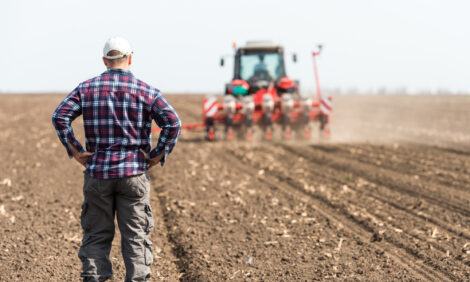



Italian Meat Company Balances Tradition, Quality with Need for Greater Sustainability
ITALY - A century-old salumi maker says sustainable and welfare-friendly processes are key to keeping its traditional products relevant to today’s consumers.To call Fumagalli Salumi a family-run business would be an understatement.
Headquartered in a lush mountain valley in the Northern Italian province of Lombardy, the century-old salumi maker still bears the surname of its founder and continues to be run by his descendants.
That is true of many food businesses in the region, where food traditionally has a deep connection to its land of origin and the people who cultivate it. What sets Fumagalli apart is the family’s involvement in every stage in the manufacture of its cured and cooked Italian pork products — from genetics and nutrition, to production, processing and packaging.
The result of this tightly controlled process is a range of products that would have been sold at the family’s original salumeria (typical Italian deli-meat shop) in Milan at the turn of the 20th century, including cooked ham, salami, pancetta, guanciale, coppa, loin and the prized prosciutto di Parma (Parma ham).
However, just because Fumagalli has made traditional products on the same land for almost a century, doesn’t mean its processes are stuck in the past. According to the founder’s grandson, Pietro Pizzagalli — a veterinarian who oversees the company’s farm systems, production and new product R&D — Fumagalli has kept its time-honored products relevant to today’s consumers by committing to making its processes more sustainable.
Total integration
For example, 25 years ago, Fumagalli started breeding its own pigs, completing the company’s integration. Having full control over the supply chain has allowed the company to distinguish itself not only with the quality of its products, Pizzagalli claims, but also its methods of production.
“We decided that to make a good-quality product, it was necessary to have good quality and welfare of pigs, so we started breeding our own,” he explains.
Fumagalli raises heavyweight pigs (160 to 170 kg), specially selected for the Italian-product market. The company’s 2,800 sows are divided among five breeding farms, which produce approximately 70,000 pigs a year. Groups of 1,000 to 2,000 pigs of the same age are raised on the breeding farms until being moved to fattening sites — a practice that Pizzagalli says has reduced the need for antibiotics.
With 25 contract fattening farms scattered throughout the northern regions of Piedmont, Lombardy and Veneto, Fumagalli requires all producers to be located no more than a 4-hour drive from the company’s slaughterhouses. According to Pizzagalli, this policy promotes not only efficiency but also welfare and environmental sustainability — areas in which the company has made significant investments in recent years.
Ahead of the curve
Marketing director Arnaldo Santi — Pizzagalli’s cousin — says consumers in Italy tend to be less concerned with animal welfare than elsewhere in Europe. However, with international sales of 70%, Fumagalli has made a point of staying ahead of the curve. The result, he says, has been robust growth in markets that place a premium on welfare, including the UK, Belgium and Sweden.
“Our welfare programs started 10 years ago, when the UK wanted to apply a higher standard than EU legislation required,” Santi says, noting that the UK is one of the company’s largest markets.
Then in June 2013, Fumagalli took its welfare efforts a step further by committing to implement the pig-welfare standards endorsed by Compassion in World Farming (CIWF), earning the UK organization’s Good Sow Commendation in 2015 for meeting its sow requirements.
A worthwhile investment
Now, Fumagalli is focused on implementing CIWF’s standards for meat pigs, which include the provision of manipulable material and no routine mutilations, such as teeth clipping, tail docking and castration.
Tail docking and teeth clipping are already prohibited on Fumagalli’s farms, Pizzagalli says, and castration of male pigs is carried out with anesthesia or analgesia within 7 days of birth. Building on that momentum, Fumagalli began conducting field trials in June 2014 with a vaccine that has been shown to prevent boar taint (an unpleasant odor associated with intact males), without having to castrate. If successful, he says, it could present an alternative to surgical castration.
He adds that the greatest obstacle to fully adopting CIWF’s standards has been the requirement of straw bedding, which is not common in Italy due to the heavier weights and longer production schedule, as well as the large amounts of feed they consume. The quality of straw available in Italy and regulations for storing straw are another challenge, he notes.
“We’ve had to make a lot of investments in CIWF’s system, and we still have a way to go before all our pigs are produced according to these standards,” Pizzagalli says. “So it’s a big investment — but we believe in it.”
An ‘important value’
In addition to welfare, Fumagalli has been investing in reducing its environmental impact, starting with the introduction of reduced plastic packaging in 2014. The following year, the company implemented a new system to limit carbon emissions.
“Sustainability has become an important value that we try to build on year by year. Every day, the family is discussing ideas to improve our processes,” Pizzagalli says.
“This means not just welfare and environmental impact but also food safety and how we support our farmers and the communities we work in.”
To assure their customers of these high standards of sustainability throughout the supply chain, Fumagalli introduced its “Ethical Label” in 2014. Currently it appears only on products sold in Italy, but other countries that sell Fumagalli products have requested it, Santi reports.
“Clients are happy because they share these values; they can choose a Fumagalli product knowing that it is produced with high standards of sustainability and welfare,” he says.
“Consumers in many countries are already looking for this, and in the future, it will become even more important in more markets.”
Taken From Voice of Sustainable Pork







